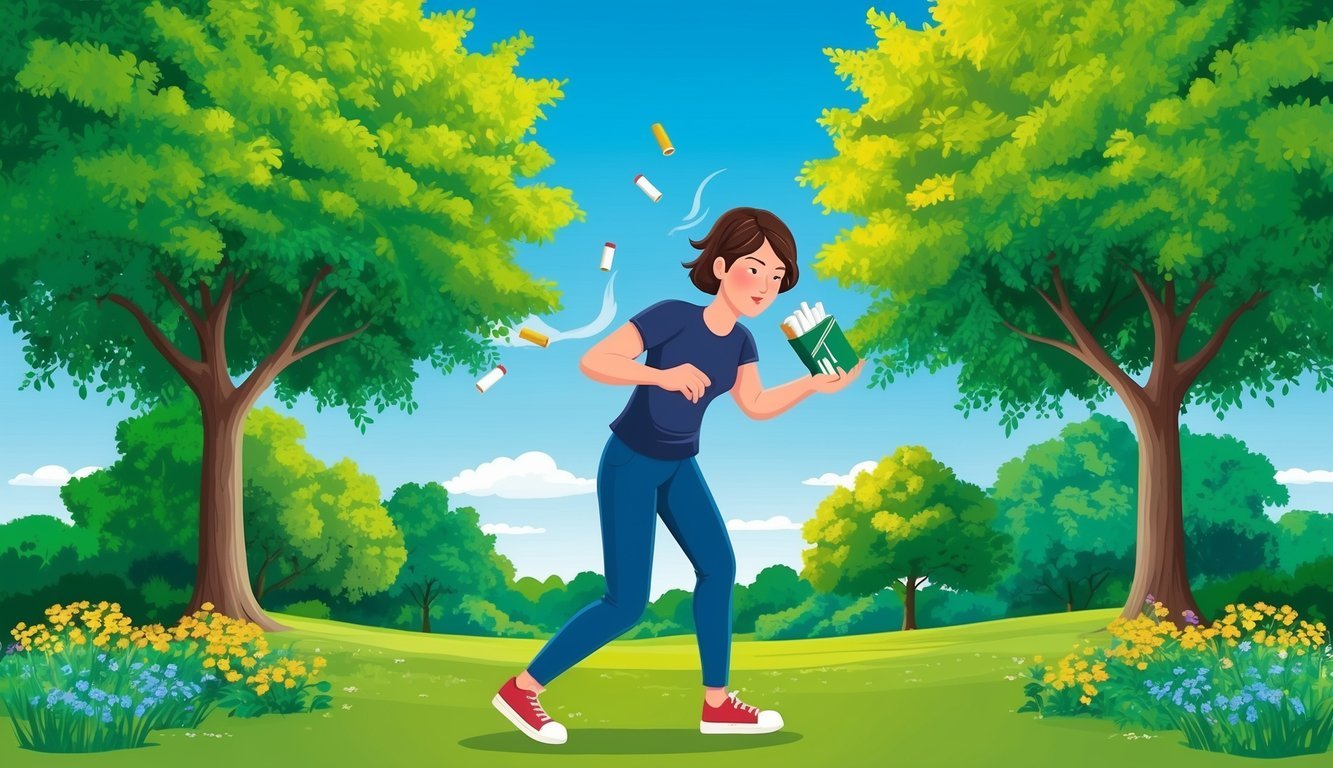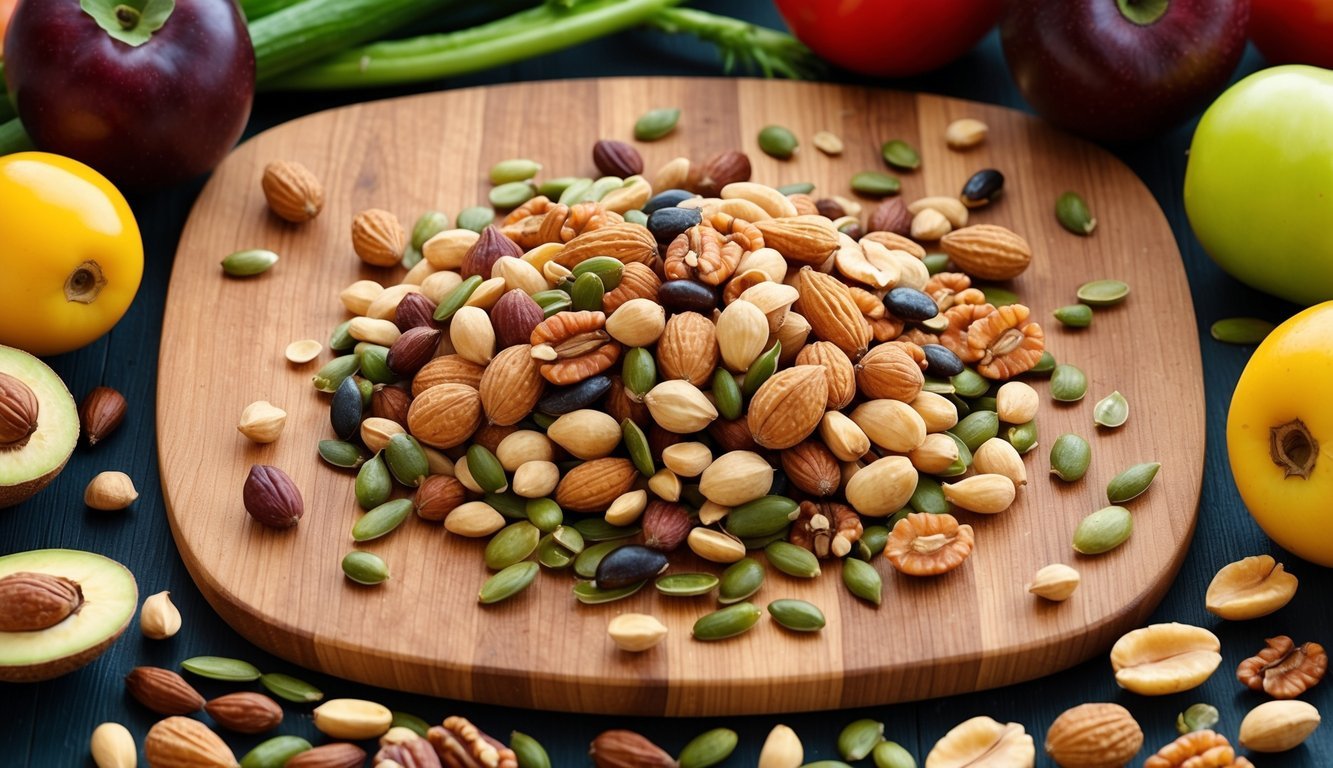As I navigate through life, I’ve come to realize that keeping my heart healthy is crucial, especially as I age.
The choices I make today can significantly impact my heart’s health in the future. By adopting simple habits and being mindful of my lifestyle, I can effectively maintain a strong heart and reduce the risk of heart disease.

Aging doesn’t mean I have to settle for a decline in health.
Instead, I can take proactive steps to keep my cardiovascular system in top shape.
With the right tips and strategies, I can enjoy a healthier life and a more energetic future.
1) Eat plenty of leafy greens

Incorporating leafy greens into my diet has been one of the easiest ways to support my heart health.
They’re packed with essential nutrients like vitamins A, C, and K, and they also provide antioxidants.
I love loading my plate with options like spinach, kale, and Swiss chard.
They add great flavor and texture to salads, smoothies, and stir-fries.
Eating greens regularly can help lower blood pressure and improve overall heart function.
They are low in calories but high in fiber, which helps me feel full while making healthier choices.
I try to prep my greens ahead of time.
Washing and chopping them right after shopping makes it more convenient to add them to meals throughout the week.
Lastly, I’ve noticed that adding greens can easily replace less healthy options on my plate.
It’s a simple switch that benefits both my heart and my taste buds.
2) Incorporate fatty fish like salmon into your diet
I’ve found that adding fatty fish like salmon to my meals really boosts my heart health.
Fatty fish are packed with omega-3 fatty acids, which can help lower cholesterol and reduce inflammation.
The American Heart Association suggests eating fish rich in omega-3s at least twice a week.
Salmon is a delicious option, and it’s easy to cook.
I love baking it with some herbs or grilling it for that smoky flavor.
Not only is salmon great for heart health, but it’s also a fantastic source of protein.
Unlike red meat, it’s low in saturated fat, which is a plus for maintaining a healthy lifestyle as I age.
Diversifying my seafood choices also keeps things interesting.
I sometimes mix in other fatty fish like mackerel or sardines.
These small changes to my diet have made a big difference in how I feel.
Plus, they’re pretty tasty!
3) Limit intake of processed sugars
I’ve noticed that cutting back on processed sugars has really helped my heart health.
Added sugars are often hiding in foods I wouldn’t suspect, like sauces and snacks.
I try to avoid sugary drinks like soda and many bottled teas.
Instead, I reach for water or unsweetened beverages.
This simple switch has made a big difference.
When I cook, I often replace sugar in recipes with unsweetened applesauce.
It works great and adds moisture without the extra calories.
Sticking to whole foods like fruits and vegetables also helps.
They satisfy my sweet tooth while providing essential nutrients.
The American Heart Association recommends that women limit added sugars to 6 teaspoons a day and men to 9 teaspoons.
Keeping track of this can guide me in making healthier choices.
By being mindful of my sugar intake, I feel better and more energetic.
It’s a small change that can lead to better heart health as I age.
4) Practice meditation or yoga regularly
Incorporating meditation or yoga into my routine has been a game changer for heart health.
Both practices help reduce stress, which is important for lowering blood pressure and maintaining overall heart function.
Meditation allows me to take a moment for myself, promoting relaxation and mental clarity.
I find that when I meditate regularly, I sleep better and manage anxiety more effectively.
Yoga not only calms my mind but also improves my flexibility and strength.
I enjoy how it connects my body and breath, making me feel more centered.
Research supports the idea that these practices can lead to healthier hearts as I age.
Regularly engaging in meditation or yoga can help lower stress hormones and improve my emotional well-being.
This balance contributes to a healthier lifestyle overall, making it easier to stay active and engaged.
5) Stay active with daily walks or cycling

Staying active is one of the best ways to keep my heart healthy.
I’ve found that incorporating daily walks into my routine has made a noticeable difference.
Just 20 minutes a day can boost my mood and my fitness level.
Cycling is another enjoyable option.
Whether it’s a leisurely ride around the neighborhood or a bit of a workout on a stationary bike, it gets my heart pumping.
I love that I can adjust the intensity based on how I feel that day.
Tracking my progress, like noting how far I walk or bike each week, helps keep me motivated.
Setting small, achievable goals makes it easier to stay committed.
Even if I start slow and build up gradually, every bit counts.
The key is consistency.
More than anything, being active helps reduce my risk of heart disease and keeps me feeling good as I age.
6) Quit smoking immediately

Quitting smoking is one of the best things I can do for my heart health as I age.
The benefits kick in almost right away.
For instance, my heart and lung function improve within just a few weeks.
I’ve learned that smoking is a major risk factor for heart disease.
The more I can reduce that risk, the better.
After one year of not smoking, my chances of heart disease drop significantly.
Nicotine withdrawal can be tough, but I remind myself that it doesn’t last forever.
Typically, it takes a month or two for the worst symptoms to fade.
To help me quit, I’ve found that setting a specific date really works.
I tell my friends and family about it for support.
Plus, having a solid reason to quit, like improving my health, keeps me motivated.
There are also resources out there that can make this process easier.
From medications to support groups, I know I don’t have to do this alone.
Deciding to quit is just the first step, but it’s a crucial one.
My heart will thank me for it in the long run.
7) Limit alcohol to moderate amounts

I’ve found that keeping my alcohol intake moderate is key to maintaining a healthy heart.
Research indicates that light to moderate drinking can have some protective effects, especially for heart health.
The American Heart Association suggests that women should limit themselves to one drink per day, while men can have up to two.
Sticking to these guidelines can help reduce the risk of cardiovascular issues.
It’s important to acknowledge that even small amounts of alcohol can have different effects on different people.
For some, it might elevate blood pressure or trigger irregular heartbeats over time.
I also learned that drinking too much can lead to other health concerns, even if it doesn’t significantly increase heart problems.
So, I try to be mindful of how much I consume, focusing on moderation.
When I choose to drink, I do so mindfully, enjoying the social aspects without overindulging.
Staying within recommended limits helps me feel good both physically and mentally as I age.
8) Stay hydrated with plenty of water

Staying hydrated is key for a healthy heart, especially as we age.
I’ve learned that drinking enough water helps my body function at its best.
It supports circulation, allowing my heart to pump blood effectively.
I aim for about 8 cups of water daily, but that varies based on my activity level and the climate.
Hot weather or exercise means I need more.
I find that keeping a water bottle handy is a great reminder to drink throughout the day.
I also make an effort to include water-rich foods in my meals.
Fruits and vegetables like cucumbers, oranges, and watermelon not only hydrate me but also provide essential nutrients.
I try to limit sugary drinks and caffeine, as they can lead to dehydration.
It’s easy to overlook how hydration affects my energy levels and overall wellbeing.
Making hydration a priority has noticeable benefits for my heart health.
9) Include nuts and seeds in your snacks

When I think about healthy snacks, nuts and seeds are often at the top of my list.
They are packed with protein, fiber, and healthy fats, making them a great choice for keeping my energy levels up.
Snack time is perfect for adding a mix of almonds, walnuts, or sunflower seeds.
Not only do they curb my hunger, but they also support my heart health.
Studies show that regular consumption of nuts may help reduce inflammation and improve artery health.
I like to keep a small portion handy throughout the day.
About 1.5 ounces is a good amount to aim for.
This way, I can enjoy their crunch without going overboard on calories.
Nuts also provide essential nutrients like vitamin E and magnesium, which are great for my overall well-being.
So next time I’m looking for a quick bite, reaching for nuts or seeds feels like a smart move.
10) Prioritize sleep and manage stress

I can’t stress enough how vital sleep is for a healthy heart, especially as I age.
Getting 7 to 9 hours each night is essential for my cardiovascular health.
Consistent sleep helps regulate blood pressure and reduces the risk of heart disease.
Before bed, I like to wind down for at least 30 minutes.
Quiet activities, like reading or gentle stretching, help me relax.
I’ve found that soothing music or relaxation exercises can also set the right mood for sleep.
Managing stress is just as important as sleep.
I make it a point to tackle my worries before they escalate.
Whether I journal or talk things out, finding my calm helps keep my heart healthy.
Staying active during the day is another way I manage stress.
Regular exercise not only promotes better sleep but also lightens my mood.
I also try to spend time outdoors, as fresh air can work wonders for my mental state.
Understanding Heart Health
Maintaining heart health is essential as we age.
It involves recognizing how the heart changes over time and being aware of common heart issues that can arise.
These insights are crucial for making informed lifestyle choices.
The Aging Heart
As we age, our heart undergoes various changes.
The heart muscle may thicken, leading to reduced efficiency.
Blood vessels can become stiffer, increasing resistance and making it harder for the heart to pump effectively.
Key Changes:
- Thickening of the Heart Muscle: This can reduce the heart’s ability to fill with blood.
- Stiffening of Blood Vessels: Blood pressure may rise as a result.
- Decreased Maximum Heart Rate: This affects our exercise capacity, making it important to adjust physical activities accordingly.
Being aware of these changes helps me prioritize my heart health.
Regular check-ups can monitor these conditions and guide necessary lifestyle adjustments.
Common Heart Conditions
Several heart conditions become more prevalent as we get older.
Understanding these can help me take preventive measures.
Key Conditions:
- Coronary Artery Disease (CAD): Caused by plaque buildup in arteries, leading to reduced blood flow. Symptoms can include chest discomfort or shortness of breath.
- Heart Failure: This occurs when the heart can’t pump enough blood to meet the body’s needs. It can lead to fatigue and swelling in the legs and feet.
- Atrial Fibrillation (AFib): An irregular heartbeat that can increase the risk of stroke. It may cause palpitations or fatigue.
Being informed about these conditions allows me to adopt healthier habits and seek medical advice when necessary.
Regular exercise, a balanced diet, and avoiding tobacco are crucial steps I can take to protect my heart health as I age.
Lifestyle Factors
Maintaining a healthy heart as I age involves several lifestyle choices that can significantly impact my cardiovascular health.
Focusing on diet, exercise, and stress management plays a crucial role in promoting heart health.
Importance of Diet
Eating a heart-healthy diet is crucial for my cardiovascular well-being.
I aim for a balanced plate filled with fruits, vegetables, whole grains, and lean proteins.
Choosing foods low in saturated and trans fats helps keep my cholesterol levels in check.
I also incorporate nuts, seeds, and fatty fish like salmon, which are among the best foods for healthy cholesterol due to their heart-friendly omega-3 fatty acids.
Staying hydrated and limiting processed foods further support my cardiovascular system, keeping my heart strong.
By making mindful dietary choices, I can maintain overall wellness and reduce my risk of heart disease.
Here are some key dietary tips:
- Limit processed foods high in sugars and salts.
- Incorporate oily fish at least twice a week for omega-3 fatty acids.
- Choose fiber-rich options like legumes and whole grains.
Staying hydrated is also important, so I make it a habit to drink plenty of water and limit sugary beverages.
These choices not only support my heart but also contribute to my overall health.
Exercise and Heart Health
Regular physical activity is one of the best ways I can protect my heart.
I try to include both cardiovascular workouts and strength training in my routine.
Aim for at least 150 minutes of moderate exercise weekly.
Activities like walking, cycling, or dancing help keep my heart healthy and boost my mood.
I also mix in:
- Strength training twice a week for muscular health.
- Flexibility exercises like yoga to improve my overall fitness.
Incorporating movement into my daily life, such as taking stairs instead of the elevator, can make a difference.
Staying active keeps my heart strong and helps maintain a healthy weight.
The Role of Stress Management
Managing stress is another essential factor for heart health.
When I’m overwhelmed, my body reacts with increased heart rate and blood pressure, which isn’t good for my cardiovascular system.
To combat this, I prioritize stress-reducing activities such as:
- Mindfulness and meditation to center myself.
- Deep breathing exercises to help calm my mind.
Additionally, I make time for hobbies and social connections that bring joy and relaxation.
These strategies help create a more balanced life and can significantly impact my heart’s health as I age.

